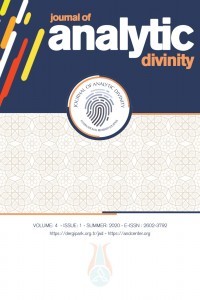GAZİLER VE YAKINLARININ MANEVİ BAKIM İHTİYAÇLARININ BELİRLENMESİNE YÖNELİK NİTEL BİR ARAŞTIRMA
Din Psikolojisi, Gaziler, Manevi Bakım, Baş etme, Manevi İhtiyaçlar
A QUALITATIVE RESEARCH ON GAZIANS AND THEIR RELATIONS FOR THE DETERMINATION OF SPIRITUAL CARE NEEDS
Veteran, Spiritual Care, Spiritual Needs, Coping,
___
- Baldacchino D (2006). Nursing competencies for spiritual care. J Clin Nurs. 15 (7): 885-896.
- Baranyai, Z , Naar, Z , Farkas, M . (2011). Role of Trust in Building Social Capital and Rural Development. International Journal of Social Sciences and Humanity Studies , 3 (2) , 519-529 .
- Calhoun, L,G., & Tedeschi, R.G. (1998). Beyond recovery from trauma: Implications for clinical practice and research. Journal of SocialIssues, 54(2), 357-371.
- Cash, T. F. (2004). Body image: past, presentandfuture. Body Image, 1, 1–5.
- Chang, S , Yu, C , Chen, M . (2018). Building a cohesive partnership: Perspectives of staff caregivers on improving self-care independence among older adults living in long-term care facilities. Journal of Aging and Long-Term Care , 1 (3) , 101-107.
- Coyle, J. (2002). Spirituality and health: towards a framework for exploring the relationship between sprituality and health, Journal of Advanced Nursing,37 (6):589-597.
- Creswell, J.W. (2016). Nitel Araştırma Yöntemleri (Beş Yaklaşıma Göre Nitel Araştırma ve Araştırma Deseni), çeviri editörleri: M. Bütün ve S.B. Demir, Ankara: Siyasal Kitabevi.
- Daştan N. B, Buzlu S. (2010) Meme kanseri hastalarında maneviyatın etkileri ve manevi bakım. Maltepe Üniversitesi Hemşirelik Bilim ve Sanatı Dergisi, Cilt:3,Sayı:1.2010 73-79
- Eker, A.T. (2012). Temel Sağlık Hizmetlerinde Ruhsal Travmaya Yaklaşım, Ankara: Türkiye Psikiyatri Derneği)
- Ergül, Ş., Bayık, A. (2004). Hemşirelik ve manevi bakım. Cumhuriyet Üniversitesi Hemşirelik Yüksekokulu Dergisi 8 (1):37-45.
- Frager, R. (2009). Manevi Rehberlik ve Benötesi Psikolojisi Üzerine Paylaşımlar (Çev. Çolakoğlu, Ö.) İstanbul: Kaknüs)
- Goswami, S., Sachdeva S., Sachdeva R. (2012). Body image satisfaction among female college students. Ind Psychiatry J., 21, 168-172.
- Hall, J. (2006). Spirituality at the Beginning of Life. Journal of Clinical Nursing 15, 804–810.
- Herman, J. (2017). Travma ve İyileşme, Çev: Tamer Tosun, (5.Baskı). İstanbul: Literatür. İleri Evre Kanserde Bakım, Çev. Editörü: Şeref Kömürcü, 2009, Ankara: Türkiye Klinikleri.
- İslam Ansiklopedisi. (1996). İstanbul: Türkiye Diyanet Vakfı.
- Linley, P.A., Joseph, S. (2004). Positive change following trauma and adversity: A review. Journal of Traumatic Stress, 17(1), 11-21.
- Mayers, C.,Leavey, G., Vallianatou, C., ve Baker, C. (2007). How clients with religious or spiritual beliefs experience psychological help-seeking and therapy: A qualitative study. Clinical Psychology and Psychotherapy, 14(4), 317-327.
- Mutlu, S. (2006). Kalıcı abdominalstomalı hastalarda beden imajı değişiminin yaşam kalitesine etkisi, Marmara Üniversitesi Sağlık Bilimleri Enstitüsü, Yüksek Lisans Tezi, İstanbul.
- Öz, F. (2004). İnsan, Spiritüel gereksinimler ve hemşirelik. MN Klinik Bilimler & Doktor,10(1), 350-355.
- Özdoğan, Ö. (2019). Değer Odaklı Manevi Güçlenme ve Bakım Programının Geliştirilmesi ve Uygulanması. 5. Uluslararası Sosyal Bilimler Kongresi Sözlü Bildiri, Üsküp.
- Özdoğan, Ö. (2010). Aşkın Yanımız Maneviyat, (2. Baskı). Ankara: Özdenöze.
- Özdoğan, Ö. (2010), İsimsiz Hayatlar, (4.Baskı). Ankara: Özdenöze
- Özdoğan, Ö. (2012). “Palyatif Bakımda Manevi Yaklaşım”. I. Ulusal Din Psikolojisi ve Manevi Bakım Çalıştayı Tebliğ Kitabı, s.44, Ankara.
- Özdoğan, Ö. (2006), Pastoral Psikoloji, AÜİFD 47, sayı 2, 127-141.
- Özsağır, Y. (2007). Ekonomide Güven Faktörü. Elektronik Sosyal Bilimler Dergisi,6(20), 46-62.
- Ross, L. (1995). The spiritual dimension: Its importance to patients’ health, wellbeing and quality of life and its implications for nursing practice. International Journal of Nursing Studies, 32, 457–468.
- Selvi, K. (2018). Erkeklerde Beden İmajı Kaygısı ve Kas Algı Bozukluğunun Öz-Belirleme Kuramı Çerçevesinde Araştırılması, ODTÜ, Basılmamış Doktora Tezi, Ankara.
- Smith, J. A.,Flowers, P. and Larkin, M., (2009). Interpretative phenomenological analysis: Theory, method and research, Sage.
- Smith, J. A. ve Osborn, M. (2003). Interpretative phenomenological analysis. J. A. Smith (Ed), Qualitative psychology. A practical guide to research methods(ss. 51-80). London: Sage Publications.
- Smith, J. A. (2011). Evaluating the contribution of interpretative phenomenological analysis. Health Psychology Review, 5(1), 9-27.
- Shakespeare-Finch, Jane, Smith, S. Gow, K. Embelton, G.&Baird, L. (2003). The Prevalence of Post-Traumatic Growth in Emergency Ambulance Personnel. Traumatology, Vol. 9, No. 1, 58-68.
- Wong K.F. Lee L.Y.K. Lee J.K.L. (2008) Hong Kong Enrolled Nurses Perceptions of Spirituality and Spiritual Care. International Nursing Review 55, 333–340.
- Yılmaz, M. ve Okyay, N. (2009). Hemşirelerin maneviyat ve manevi bakıma İlişkin görüşleri. Hemşirelikte Araştırma Geliştirme Dergisi, 3, 41-52.
- Yayın Aralığı: Yılda 2 Sayı
- Başlangıç: 2017
- Yayıncı: Özcan GÜNGÖR
KUR'AN-I KERİM VE HZ. PEYGAMBER'İN HADİSLERİNDEKİ NEFSÂNÎ HİTÂP
TEKNİSYENLER, DANIŞMANLAR VE ANLAM ÜRETENLER OLARAK SOSYAL BİLİMCİLER
KUR'AN-I KERİM VE HZ. PEYGAMBER'İN HADİSLERİNDEKİ NEFSÂNÎ HİTÂP
DİNİ SOSYALLEŞME SÜRECİNDE DİNİ EĞİTİM KURUMLARI VE SURİYELİ SIĞINMACILAR ‘KİLİS ÖRNEĞİ’
EL-MEVSÛ'ATU'l-YÛSUFİYYETU FÎ BEYÂNİ EDİLLETİ'S-SÛFİYYETİ
IRAKLI ŞAİRLERİN 20. YÜZYIL BAŞLARINDA BATILI GÜÇLERİN ARAP TOPRAKLARINI İŞGALİ KARŞISINDAKİ TUTUMU
KERRÂMİYYE'NİN KELAMÎ VE FIKHÎ MESELELERE YAKLAŞIMI
